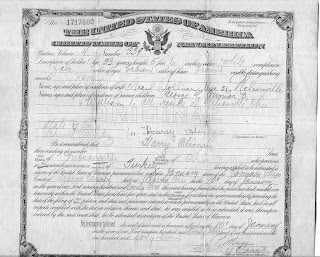Lesson #4
What Records Tell Us
CENSUS RECORDS
- Each census record will tell you different things! The US started censuses in 1790 and the UK started in 1841. The US releases censuses to the public every 72 years, the UK every 100 years. The 1940 US census record will be available in the spring of 2012.
- Not every census record is available (1890 US census was mostly destroyed and most of Ireland’s census records were burned).
- If you find an ancestor on a census but can’t find them in the next census, search the next census by the address where they lived. It could be they’re still there!
- Check out who lives next door to your ancestor; oftentimes relatives lived close together. If someone lived on your ancestor’s street with the same last name, that could be another ancestor for you!
- A CENSUS CAN TELL YOU:
- An ancestor’s occupation.
- Where they were born and their age.
- Where their parents came from.
- If they immigrated or if they’re citizens.
A RESOURCE FOR CENSUSES:
familysearch.org
IMMIGRATION RECORDS:
- There are different kinds of immigration records: emigration (leaving a country), passenger lists (ship records), immigration (coming into a country), and naturalization (becoming a citizen).
- The older a naturalization record is (1800s), the less it will tell you.
- Before 1892 most immigrants immigrated into New York through Castle Garden Port, not Ellis Island!
- Country of origin.
- If any relatives were traveling with them.
- Ancestor’s occupation.
- Ancestor’s destination.
A NATURALIZATION RECORD CAN TELL
YOU:
- Details of where the ancestor came from.
- Name of parents.
- Current residence.
- Occupation.
A RESOURCE FOR NATURALIZATION RECORDS: familysearch.org
A RESOURCE FOR PASSENGER LISTS:
ellisisland.org,
 |
| Minnie Estell Tolliver Death Certificate |
VITAL RECORDS:
- Vital records are birth, marriage, and death records for an ancestor.
- Social Security Death Index is useful for people who died after 1960’s.
- In 1837 England began civil registration (registering vital records on a governmental level). Before that all vital records were recorded by the parish (areas based on proximity to local church). Therefore it’s IMPORTANT to find out which religion your ancestor followed!
- A VITAL RECORD CAN TELL YOU:
- Names of ancestor’s parents.
- Time and place of an event (birth, marriage, death) took place.
- Cause of death.
- Maiden name (if marriage record).


No comments:
Post a Comment